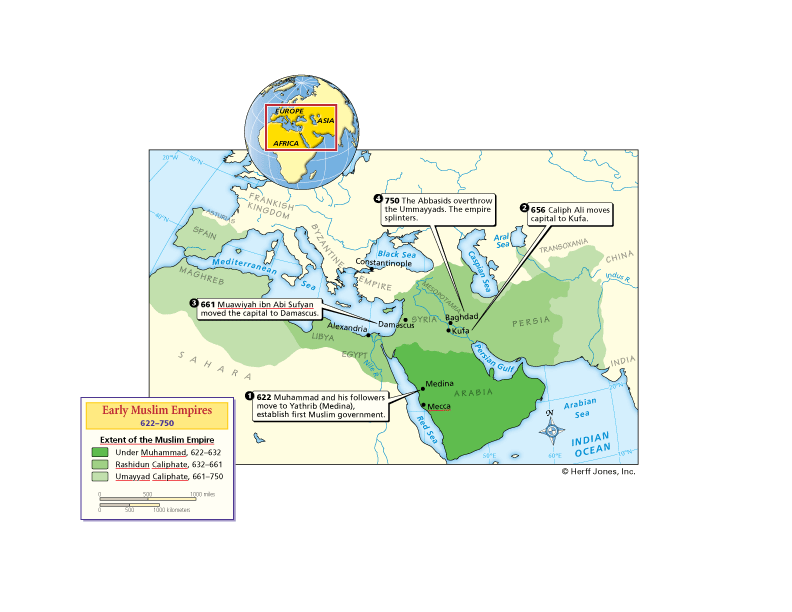
Islam has never made a firm division between religious authority and political authority found in some other religions. For the period of time covered in this map, there was a single Islamic empire, which ruled all Muslim believers. After 750, multiple Muslim empires were formed so the spread of the religion of Islam was distinct from the conquest of areas by a single empire.
Muhammad began reciting the Qur'an, the Islamic holy book, to his followers in 610 after a series of revelations from God, Allah in Arabic. He led the Muslim community (umma) as its prophet and commander (emir in Arabic) until his death in 632. He was able to unify the Arabian Peninsula mainly through diplomacy, but also war against the leadership of Mecca.
Rashidun roughly translates as "rightly guided." The first four caliphs ("successors") were thought to be guided by Muhammad, whom they had known personally and had followed since the earliest days. During this time, the Sunni/Shi'a division occurred, leading to two civil wars call the Fitna ("Tribulation").
The Shi'atu Ali ("Party of Ali") or Shi'ites believed that the caliph, specifically Ali who was Muhammad's son-in-law and the fourth caliph, had the authority to interpret and add to Islamic teaching. The Sunni (roughly translated as "Traditionalist") believed that no one person held that power since Muhammad himself.
The Shi'atu Ali ("Party of Ali") or Shi'ites believed that the caliph, specifically Ali who was Muhammad's son-in-law and the fourth caliph, had the authority to interpret and add to Islamic teaching. The Sunni (roughly translated as "Traditionalist") believed that no one person held that power since Muhammad himself.
The Umayyad Caliphate was founded by Muawiyah ibn Abi Sufyan in 661. The unified Umayyad Caliphate came to an end in 750 when the Abbasids, descendants of Muhammad's uncle, took control. A branch of the Umayyad family re-established its caliphate in Spain and northwestern Africa, surviving until 1031.
Mecca is the birthplace of Muhammad and considered the holiest city in Islam.
A caliph is a Muslim leader who is considered the political, but not religious, successor to Muhammad. A caliphate is the territory the caliph rules. Today no Muslim ruler is recognized as the caliph. The last widely recognized caliph resigned in 1924.
Muawiyah ibn Abi Sufyan had originally fought against Muhammad during the wars between Mecca and Medina. After Mecca surrendered and he converted, he helped write down the Qur'an from Muhammad's dictation.